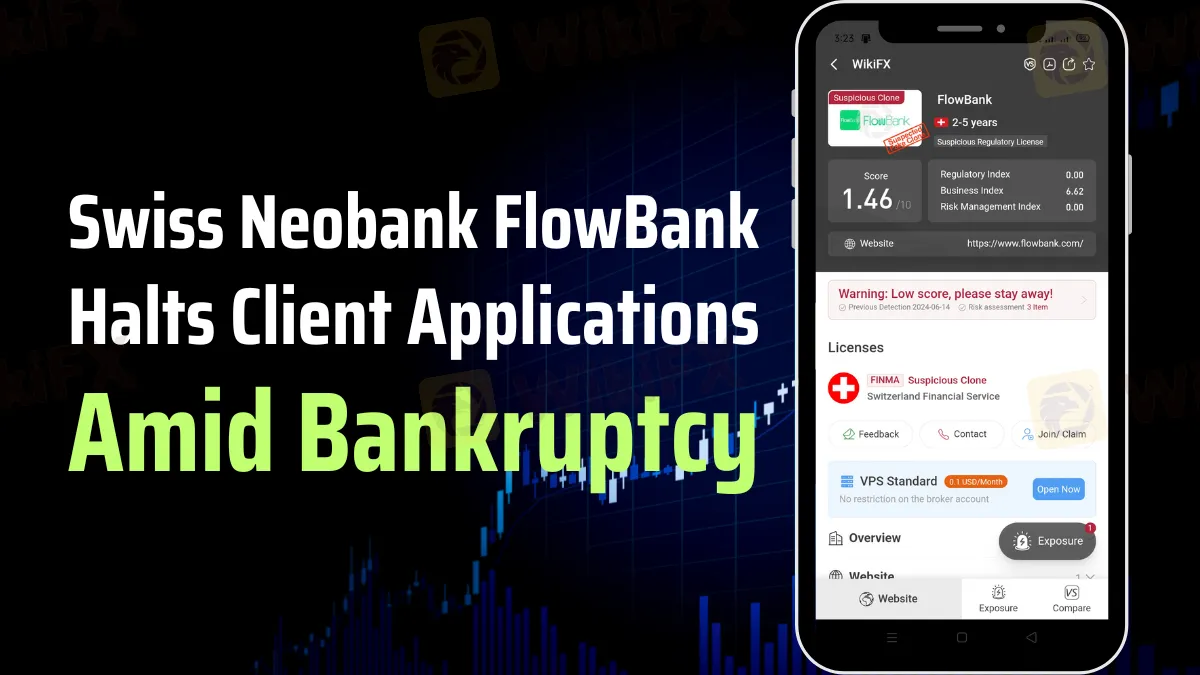简体中文
繁體中文
English
Pусский
日本語
ภาษาไทย
Tiếng Việt
Bahasa Indonesia
Español
हिन्दी
Filippiiniläinen
Français
Deutsch
Português
Türkçe
한국어
العربية
Swiss Neobank FlowBank Halts Client Applications Amid Bankruptcy
Abstract:Swiss neobank FlowBank stops new client applications and onboarding as financial regulator FINMA initiates bankruptcy proceedings.

FlowBank, a Swiss online neobank, unexpectedly ceased accepting new customer applications and stopped providing client onboarding. This comes following the announcement earlier today that the bank will be filing for bankruptcy by the Swiss financial authority, FINMA.
While FlowBank's primary website is still up and running, a maintenance notice has been added to the “Open an Account” page informing users that the onboarding procedure is now not accessible. Customers who need help opening an account can get in touch with customer support.

CEO Charles-Henri Sabet founded FlowBank in 2020, with an initial emphasis on banking and investing operations. It has, however, just changed its emphasis to online CFD trading, which was akin to Sabet's prior business endeavor, London Capital Group Ltd (LCG). The cryptocurrency investment firm CoinShares owns a sizeable 30% of FlowBank's ownership.
Concerns about FlowBank's financial stability led FINMA to decide to file the bank for bankruptcy. The regulator disclosed that FlowBank may be overindebted and no longer satisfies the minimal capital criteria required for its operations. With preliminary estimates showing that FlowBank's “privileged deposits” may be completely reimbursed from the bank's available cash, this step seeks to safeguard depositors.

It's still unclear how FlowBank's insolvency would affect LCG, a subsidiary. Despite not having submitted its 2022 financial accounts—which are late by over six months—LCG is purportedly in good standing and has a separate license from the UK's Financial Conduct Authority (FCA).
The group also comprises LCG Capital Markets Limited, an offshore company based in the Bahamas, and London Capital Group (Cyprus) Ltd, a company whose CySEC license was revoked in 2021.
The demise of FlowBank is the second big blow to neobrokers in Europe in less than a year. Due to ongoing losses, Amsterdam-based BUX was sold to ABN Amro in the latter part of last year. The demise of FlowBank highlights the financial risks that may occur in the quickly changing digital banking ecosystem and adds to the expanding list of issues affecting the neobank industry.
Stakeholders and customers are waiting for more information as it develops on FlowBank's bankruptcy procedures and the implications for the neobanking sector as a whole.
You may also access the latest news in the financial market here.

Disclaimer:
The views in this article only represent the author's personal views, and do not constitute investment advice on this platform. This platform does not guarantee the accuracy, completeness and timeliness of the information in the article, and will not be liable for any loss caused by the use of or reliance on the information in the article.
Read more

Bybit Shuts Down NFT Marketplace Amid Crypto Market Downturn
Bybit announces the closure of its NFT marketplace, citing efforts to streamline offerings. Discover the latest trends in the declining NFT market and its shift to utility-based growth.

March Oil Production Declines: How Is the Market Reacting?
Oil production cuts in March are reshaping the market. Traders are closely watching OPEC+ decisions and supply disruptions, which could impact prices and future production strategies.

How to Calculate Leverage and Margin in the Forex Market
Leverage amplifies both potential profits and risks. Understanding how to calculate leverage and margin helps traders manage risks and avoid forced liquidation.

Galaxy Digital Settles $200M in Luna Token Manipulation Case
Galaxy Digital pays $200M to settle Luna token manipulation probe by NY regulators, linked to TerraUSD’s 2022 crash, impacting crypto market stability.
WikiFX Broker
Latest News
Exposing the Top 5 Scam Brokers of March 2025: A Closer Look by WikiFX
Gold Prices Climb Again – Have Investors Seized the Opportunity?
Webull Launches SMSF Investment Platform with Zero Fees
Australian Regulator Warns of Money Laundering and Fraud Risks in Crypto ATMs
The Withdrawal Trap: How Scam Brokers Lure Victims into Paying More
FCA to Investors: Think Twice Before Trusting These Brokers
Trump\s tariffs: How could they affect the UK and your money
Trump gambles it all on global tariffs he\s wanted for decades
HTFX Spreads Joy During Eid Charity Event in Jakarta
How Will the Market React at a Crucial Turning Point?
Currency Calculator







